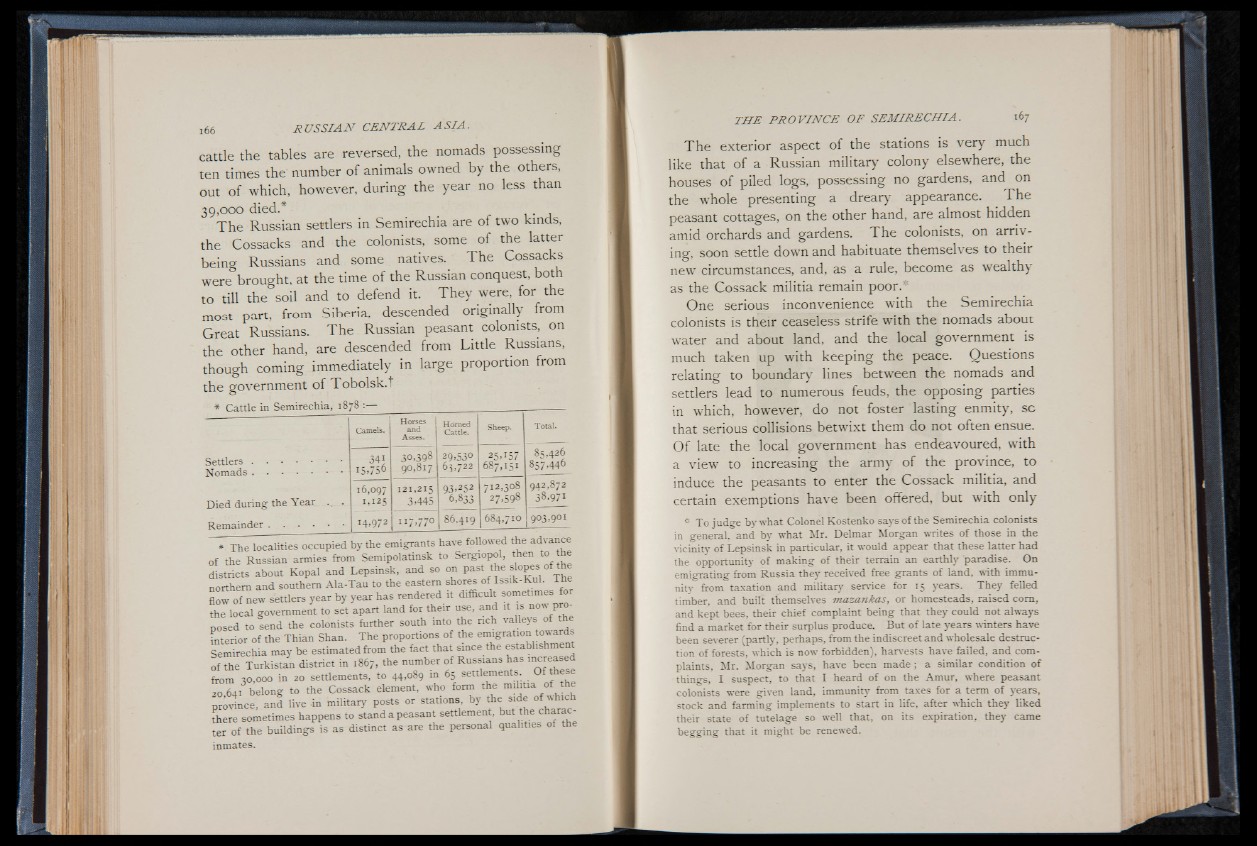
cattle the tables are reversed, the nomads possessing
ten times the number of animals owned by the others,
out of which, however, during the year no less than
39,000 died.*
The Russian settlers in Semirechia are of two kinds,
the Cossacks and the colonists, some of the latter
being Russians and some natives. The Cossacks
were brought, at the time of the Russian conquest, both
to till the soil and to defend it. They were, for the
most part, from Siberia, descended originally from
Great Russians. The Russian peasant colonists, on
the other hand, are descended from Little Russians,
though coming immediately in large proportion from
the government of Tobolsk.t
* Cattle in Semirechia,
Settlers
Nomads
Died during the Y e ar
R em a in d e r . . . . . . . . *
Camels.
Horses 1
and
Asses.
Homed
Cattle.
Sheep. Total.
341
15 .7 5 6
30.39s
90,817
29.530
63,722
2 5 , 1 5 7
687,151
85,426
857,446
16,097
1 , 1 2 5
121,215
3.445
93.252
6,833
712,30s
27.598
942,872
38.971
14 .9 72 i t ? . ? / 0 86,419 684,710 903,901
* The localities occupied by the emigrants have I ,
of the Russian armies from Semipolatinsk to Sergtopol, then to the
districts about Kopal and Lepsinsk, and so on P « t the sl°pes of the
northern and southern A la-Tau to the eastern shores of Issik-Kul. 1 he
flow of new settlers year by year has rendered it difficult sometimes fo
the local government to set apart land for their use, and it is now prm
posed to send the colonists further south mto the rich valleys of th
interior of the Thian Shan. The proportions of the emigration ton ards
Semirechia may be estimated from the fact that since the establishment
of the Turkistan district in 1867, the number of Russians has '"creased
from 30,000 in 20 settlements, to 44,089 in 65 settlements Of these
20641 belong to the Cossack element, who form the militia of the
province, and live in military posts or stations, by the side of which
there sometimes happens to stand a peasant settlement, but the character
of the buildings is as distinct as are the personal qualities of the
inmates.
The exterior aspect of the stations is very much
like that of a Russian military colony elsewhere, the
houses of piled logs, possessing no gardens, and on
the whole presenting a dreary appearance. The
peasant cottages, on the other hand, are almost hidden
amid orchards and gardens. The colonists, on arriving,
soon settle down and habituate themselves to their
new circumstances, and, as a rule, become as wealthy
as the Cossack militia remain poor.*
One serious inconvenience with the Semirechia
colonists is their ceaseless strife with the nomads about
water and about land, and the local government is
much taken up with keeping the peace. Questions
relating to boundary lines between O J the nommads and
settlers lead to numerous feuds, the opposing parties
in which, however, do not foster lasting enmity, sc
that serious collisions betwixt them do not often ensue.
Of late the local government has endeavoured, with
a view to increasing the army of the province, to
induce the peasants to enter the Cossack militia, and
certain exemptions have been offered, but with only
0 To judg e by what Colonel Kostenko says o f the Semirechia colonists
in general, and by what Mr. Delmar Morgan writes o f those in the
vicinity of Lepsinsk in particular, it would appear that these latter had
the opportunity of making of their terrain an earthly paradise. On
emigrating from Russia they received free grants of land, with immunity
from taxation and military service for 15 years. They felled
timber, and built themselves mazankas, or homesteads, raised com,
and kept bees, their chief complaint being that they could not always
find a market for their surplus produce. But o f late years winters have
been severer (partly, perhaps, from the indiscreet and wholesale destruction
of forests, which is now forbidden), harvests have failed, and complaints,
Mr. Morgan says, have been m ad e ; a similar condition of
things, I suspect, to that I heard of on the Amur, where peasant
colonists were given land, immunity from taxes for a term o f years,
stock and farming implements to start in life, after which they liked
their state of tutelage so well that, on its expiration, they came
b egging that it might be renewed.